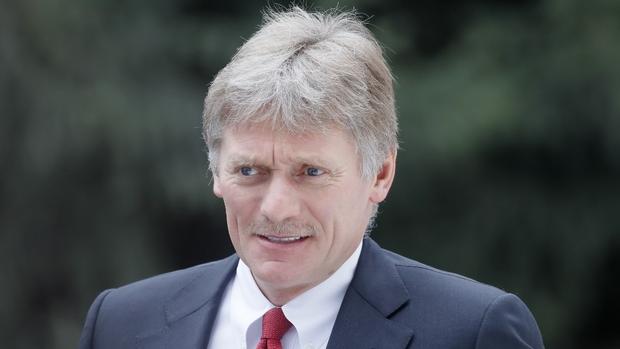 Kremlin spokesman Dmitry Peskov waits before a welcoming ceremony attended by Russian President Vladimir Putin and Kyrgyz President Sooronbay Jeenbekov (both not pictured) in Bishkek on March 28, 2019. (MAXIM SHEMETOV / POOL / AFP)
Kremlin spokesman Dmitry Peskov waits before a welcoming ceremony attended by Russian President Vladimir Putin and Kyrgyz President Sooronbay Jeenbekov (both not pictured) in Bishkek on March 28, 2019. (MAXIM SHEMETOV / POOL / AFP)
MOSCOW / BERLIN - The Kremlin on Monday denied any involvement of Russian authorities in the suspected poisoning of opposition leader Alexei Navalny, as the politician was taken out of a medically induced coma in Berlin.
Navalny fell into a coma after being hospitalized in Omsk with suspected poisoning symptoms and was later transferred to Germany for treatment
"Attempts to somehow associate Russia or the Russian leadership with what happened are unacceptable to us. They are absurd in essence," Kremlin spokesman Dmitry Peskov told a daily briefing.
According to Peskov, the Kremlin is waiting for information from Germany on the Navalny case.
"We hope that, given the resonance of this issue, information will be provided in the coming days. We are looking forward to it," Peskov said.
ALSO READ: Kremlin says it doesn't want Navalny illness to hurt ties with West
In Berlin, the Charite hospital said Navalny has been removed from a medically induced coma and is responding to speech.
The hospital, which has been treating Navalny since he was airlifted to Germany after falling ill on a Russian domestic flight last month, said his condition has improved and he is being weaned off mechanical ventilation.
“It remains too early to gauge the potential long-term effects of his severe poisoning,” Charite said in a statement.
Navalny, a harsh critic of the Kremlin, felt unwell on the flight from the Russian city of Tomsk to Moscow on Aug 20 and the plane had to make an emergency landing in the city of Omsk.
Navalny fell into a coma after being hospitalized in Omsk with suspected poisoning symptoms and was later transferred to Germany for treatment.
Last week, German Chancellor Angela Merkel said Navalny, who was in intensive care in a Berlin hospital, was poisoned with a Soviet-style nerve agent, the same type that was used in 2018 to poison former Russian spy Sergei Skripal and his daughter.
READ MORE: Russian parliament to probe possible foreign link to Navalny illness
With inputs from Reuters


